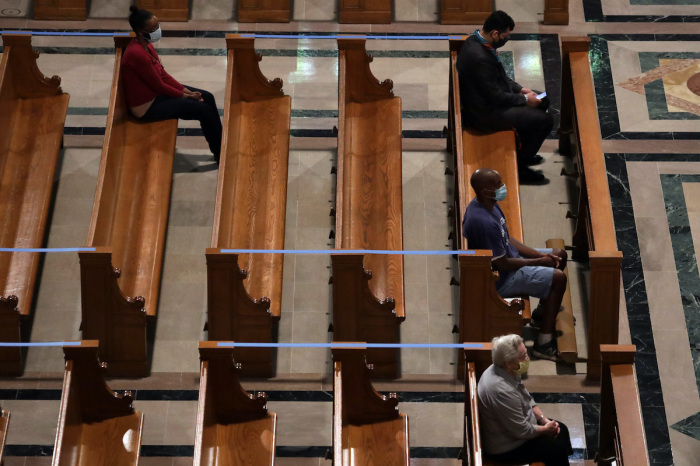How the church can stop following and start leading the culture of economics

David Bahnsen is a principle of the Bahnsen Group, which is a financial services company located in Newport Beach, CA and New York City. David is also the author of numerous books including Crisis of Responsibility and his newest book, There's No Free Lunch: 250 Economic Truths.
I recently talked with David on my podcast Meeting of Minds, and David will soon appear on the podcast Business in the Kingdom on the Edifi network, here are a few highlights from that discussion, lightly edited for clarity and length:
Jerry: Your book is terrific. I have the table of contents in front of me right now ... and you seem to be covering essentially every major topic in economic theory and practice in what is a relatively short and easy to read book.
David: I believe all those applications and all of those topics flow out of the first two: human flourishing and human action. The idea was to early on in the book try to set some foundational truths for people that want to approach this with a faith worldview, that want to see what they believe about the truth claims of scripture, what I consider to be creation reality applied to economics, applied to the way humans interact with one another, applied to how we view money. So those various topics really become applications out of the first.
Jerry: You work with money. You're an economist. You're in finance. You grew up in a Christian home. You were raised by a father who was a very prominent Theologian. So you're in the world of money, which some people call Mammon, to give you some sense of what they think money inherently is. So you've spent your life navigating between those worlds. What do you see out there in the Christian conversation that you can help with? Where you can say “this is where maybe we're kind of going awry, and this is how we can get back to some of those economic truths”?
David: I think that you have a tendency for the Christian church, sometimes, when it gets away from an earnest desire to bring truth claims of scripture to topics and culture to the public square, that what it ends up doing when it's not leading: it ends up following.
Right now the trend in the culture is this idea of redistributing wealth, of demonizing entrepreneurs, of looking down upon productivity. If that becomes the trend in the culture—a greater desire for central planners, for the government to come in and steward the affairs of the economy—then the church often ends up following. And my belief is that if the church were to recover some of the first principles of creation reality, which is to me the foundation of Economics, then the church will avoid that wrongheadedness that follows some of the the really ill-advised ideas in our political life right now, and in culture at large.
And so when you mention my first book, Crisis of Responsibility, I think that there is a big tendency right now in the church to join on the bandwagon of (in some cases, not all) well-meaning but ill-advised pursuits: the social justice movement, forgetting how wealth is truly created, focusing on the distribution and allocation of the wealth pie instead of the growth of the wealth pie, and more particularly, instead of on the productivity that actually ought to be leading the whole conversation. How can we be better stewards of the resources God has given us? And if we are maximizing our stewardship and are productive behavior, will that grow the overall wealth pie and lead to greater poverty alleviation? Will it lead to greater justice, to greater opportunity for all humans to flourish. I want the church to have these conversations instead of mimicking, I think, the rather unwise conversations of the world.
Jerry: Mimesis, that's what Girard calls mimesis. We choose some model that we associate with or that we want to be like, and then we mimic that. Girard said you either imitate Christ or you imitate somebody else. And whoever that somebody else is going to be is not going to be as good a model to imitate as Christ. Christ Himself said, “disciple the nations.” I suppose what we're learning is that if we don't disciple the nations, the nations will disciple us, and in the wrong direction.
David: That's exactly right. And I think that we've seen it play out in a lot of different spheres of society and the public square over the last 100 years in education, academia, the arts, and in entertainment. I think right now people are scratching their heads about technology not realizing that Christians largely left the great technological revolution, the digital revolution of the last 50 years. So they forfeited a seat at that table, so to speak. And it's really created a significant ditch for us to have to dig ourselves out of.
I very much want that to not be the case with finance. You are right with the Mammon rhetoric people who have a natural skepticism and cynicism about finance, about Wall Street, about capital markets. And yet, I’ve got to be honest: it doesn't bother me. I'm up for it because I believe that truth is on our side, and I can optimistically and with empathy share why I believe that we need capital. We need the sphere of finance, just as much as we need all these other spheres. And I think that through time people will realize that this is just another aspect of God's kingdom.
Jerry Bowyer is financial economist, president of Bowyer Research, and author of “The Maker Versus the Takers: What Jesus Really Said About Social Justice and Economics.”





























